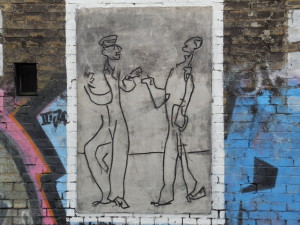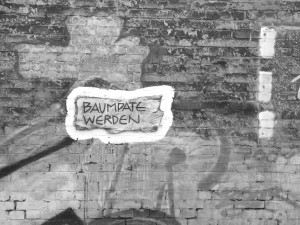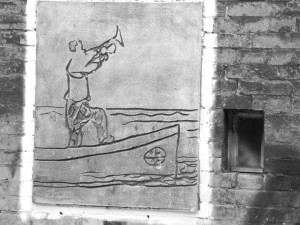Die Bäume wurden beschnitten, und Sancho hatte keinen Durchfall mehr. Gerne dachte er an seinen Hund. So lange auf den Autobahnen unterwegs mit den elend gleichförmigen Raststätten! Autobahntrance funktioniert nicht immer. Als Julio einst mit Carol die Autobahn bereiste, war der Verfall der Raststätten noch ein Abenteuer. Wenn er Hotels sucht, fährt er ins Hinterland, und studiert die Gardinen, die nie den Muff einer alten Zeit haben dürfen. Er weiss, wie er sich abends vor dem Einschlafen in andere Welten treiben lassen kann, aber diesmal ist es hart, das Buch, das er liest. Er fiebert mit Audie Palmer, eine grossartig gebrochene Figur, die durch amerikanische Alpträume geistert. Kann man soviel Unglück austanzen? Hätte er den Namen Kronach auf einem Schild gesehen, wäre er dorthin gefahren. An seiner Studentenzeitstadt Würzburg vorbeizufahren, ist schaurigschön: „ghost town“. Im Player sind sie alle versammelt, „The Ghosts of Highway 20“. Würde Michael Hutter im „Zündfunk“ zu hören sein, wäre er ein Zeitreisender. So viele Namen, alle schlagen Funken. In Heidelberg hat er eine Jukebox verloren.
Archives: Januar 2016
2016 28 Jan
Zwei Tage zwischen Kiel und Regensburg
Michael Engelbrecht | Filed under: Blog | RSS 2.0 | TB | Comments off
2016 28 Jan
In the words of Nicholas Johnson, codirector of the annual Samuel Beckett Summer School
Manafonistas | Filed under: Blog | RSS 2.0 | TB | Comments off
Ladies and gentlemen, dear readers, dear club of the Manafonistas! In one of his many bursts of formally specific creativity, Samuel Beckett explored the medium of radio from 1956 to 1963, creating five original works. He wrote, in a letter to Nancy Cunard, that a “gruesome idea” had come to him “in the dead of the other night”, an idea that became All That Fall.
He approached these scripts with as much precision as he did his plays, seeking through the printed word to communicate with the directors, actors and technicians who would bring the words to life, so that they might, through a mass medium, pass on this auditory hallucination to others. Yes, auditory hallucinations! We sometimes forget the magic of the everyday life.
There are two moments, at which I tend to picture Beckett with his ear pressed to the wireless. The first is at the outbreak of war in Europe in 1939, when I can imagine him in Paris, trying to get the news from the BBC. There is more biographical justification for the second occasion, during the broadcast of All That Fall in 1957, when it seems that bad weather across the Channel gave him only vague impressions of his play, with long passages of static.
This is a potent reminder of how challenging it has been in the past just to listen to the radio. The presence of any apparatus at all is easy to forget in the contemporary era, when “wireless” is more often used to refer to the internet, which we think of as the newer, stronger and younger mass medium.
It is also helpful to remember that “fidelity”, much discussed by Beckett scholars in relation to how closely one adheres to Beckett’s wishes for performance, has an additional, concrete meaning for the radio drama: can I hear it?
Now that we are beyond the era of crystal sets, vacuum tubes and ham enthusiasts, those who seek company have millions of hours and hundreds of languages to choose from, and they can take these sounds with them while walking, cycling, driving, cooking or cleaning. Countless identities, narratives and thoughts, compressed into tiny files, have passed fully into the control of the listener.
From its origin as a kind of miraculous, tenuous link to voices and bodies elsewhere, radio now forms only one part of the ubiquitous and continuous background noise that marks contemporary life.
It is within this auditory context that Pan Pan’s presentation of All That Fallon stage, at the Abbey Theatre in Dublin, in February 2016, after years of international touring, finds its form and its significance.
Listening is again turned into an active and sensory occasion, and a specific chamber for the experience is designed that marks it out as distinct from the bombardment of sound everywhere else in the world. It is a throwback both to an era when families tuned in together and, still further back, to the preradio era of the seanchaí and the filí, when the oral tradition made the event of a story more important than the physical object of the book. Good night, and good luck!
2016 27 Jan
Siebenundzwanzig Eins Sechzehn
Uwe Meilchen | Filed under: Blog | RSS 2.0 | TB | 5 Comments
Nicht alle Tage gelingen in den Augen des jeweiligen Betrachters. Diese Feststellung ist auch schon in Liedform festgehalten worden; ich erinnere einen Countrysong, der die Binse festhielt, dass manche Tage Diamanten, manche Tage aber Steine waeren. Und was hilft uns in solchen Momenten, wenn wir feststellen, dass „man“ (wer?) uns einen gebrauchten Tag verkauft hat? Ich fuer meinen Fall habe festgestellt, dass Liedtexte, denen man in der Vergangenheit fast gar keine Beachtung geschenkt hat, manchmal etwas Troestliches haben. Zumal wenn man diese lyrics als Zeichen der Anteilnahme mitgeteilt, sozusagen von aussen herangereicht bekommt. Per Mail zum Beispiel. Die Songtexte sind die Texte zu den beiden Teilen von „Pigs On The Wing“ von PINK FLOYD vom Album Animals. Und was soll ich sagen: die Texte passen.
2016 27 Jan
Schneekugeln 6: Diphthongal intifada!
Ian McCartney | Filed under: Blog | RSS 2.0 | TB | Comments off
„From light we come, and to light we go.
From the light of this understanding I moved against the human aberration of War
and followed its tribal roots down into the dark bowels of recorded history and beyond.
Never did I imagine such an incredible journey.“
Stan Hall (1936 -2008)
We Are Hungry Men, the 6th track on the first David Bowie album, starts off, typically, with firing sparks of genius. „Here is the news …“ it goes, in an a voice that takes its caricature of RP beyond caricature or even satire and into a place that its target deserves: nowhere.
RP was the accent adopted by English broadcasters in the middle of the 20th century. RP – received pronunciation. It’s an infinitely stupid term, as is enacted by the artist in those 4 words. RP is meant to be the speaking voice of reasoned thought, but was in practice a vessel for the 20th century’s colonial (soon to be very postcolonial) insecurities. Here is the news. Fuck the news, and its bombast. Tomorrow is yesterday. Phonemic subversion becomes diphthongal intifada.
The lyrics that follow examine catastrophism, ecologocentrism, Victorian patricianism and globalisation with humour and a lightness of touch. This is the news: the news is not news but history. And history is just facts but not the vibration/iration of everyday life.
The far future tells us so – a look to the relatively near past for intimations of the eschaton throws up just as much as a look to yesterday, tomorrow or anytime else in any epoch of any lithosphere.
2016 26 Jan
Happy birthday Lucinda Williams
Lajla Nizinski | Filed under: Blog | RSS 2.0 | TB | Comments off
Heute wird die Southern Belle 63 Jahre alt.
Gestern erschien sie in einem enganschmiegsamen Lederteil auf der Bühne im AB (Ancienne Belgique) in Brüssel. Ihre ausgezeichnete Band „Buick6“ spielte vorwiegend vor männlichem Publikum 50+ und groovte solange, bis ihre Lady erschien und den Opener: I NEED PROTECTION von der Bühne heulte. Diese bekommt sie bezeugtermaßen von ihren Geschwistern, mit denen sie in CRESCENT CITY „laissez les Bons Temps roulez.“ Sie singt es großartig. BUS TO BATON ROUGE, mit dem muss sie dorthin zurück. Während sie spielt, steht sie unbeweglich da, wie der weisse Schwan auf der Flagge von Louisiana. DRUNKEN ANGEL befreit sie, sie sagt: „The ice is broken now.“ Sie erzählt von einem Mann, der vorgibt aus Louisiana zu sein, weil er sich nur dort Zuhause fühle. Dort, das ist LAKE CHARLES. Mein Highlight an diesem energetischen Abend.
Ihre Erzähllaune ist erstaunlich. Sie erinnert an ihren Vater, der vor einem Jahr, genauer am 1. Januar gestorben ist, genau wie Hank Williams vor vielen Jahren, sie sei aber keine Verwandte. Ihr Vater sei ein southern Poet gewesen und sie würde nun DUST für ihn und für uns spielen. „There’s a sadness so deep, the sun seems black“ … Was für eine atemberaubende Bluessängerin sie sein kann. Im Raum ist es still, bis zu dem letzten Ton. „Even your thoughts are dust, even your thoughts are dust … “ In die Betroffenheit hinein sagt sie: „My father always said, the sad stories are the richest.“
Es folgt THE GHOSTS OF HIGHWAY 20 von der neuen DoppelCD, die auch so heisst. Spätestens jetzt hört man Bobby heraus: „Strike another match, go start a new …“, denn “ … the highway is for gambler, better use your sense … “ – und das nimmt sie literally und rockt los.
„Just take my way, that’s the highway, that’s the best, get your kicks on Route 66.“ Die Rolling Stones klangen immer mal wieder in ihrer Band durch. Neue Stücke wie PLACE IN MY HEART oder FACTORY werden von ihrer Band rockig unterlegt, sie hält gut mit, snifft und trinkt zwischen durch Rotwein. Die Texte liest sie ab. Sie hat längst die Dustbowl mit der Farmerkrume von Tike und Ella im HOUSE ON EARTH verlassen. Sie ist weg von dem lebensmüden Nick Drake, den sie so verehrt. Sie ist speedy, stark wie Springsteen, soft aber rockig wie Van Zandt. Die beiden Zugaben sind dermaßen laut, dass ich den Saal verlasse und an der Bar denke: „She’s Just Killing Me“ (ZZ Top).
2016 26 Jan
Ein Lob auf den Western (remix)
Michael Engelbrecht | Filed under: Blog | RSS 2.0 | TB | 8 Comments
Es war ja nur ein kleiner Dialog unter Filmfreaks, aber er klang nach. Ein Freund nordischer Musik, Mr. Biermann, erwartet von Quentin Tarantino, nach dem entfesselten Django, kein Meisterwerk, aber er sei gespannt auf die Roadshow-Version seines neuen Westerns. Ach, Meisterwerke gebe es ja genug, antwortete ich, und da ich eine gewisse Schwäche für klassische, uralte, moderne und postmoderne Western habe, kann ich die Darbietung in der Essener „Lichtburg“ kaum erwarten. Es wird, ich ahne es, archaisch. Und dieses schöne, lang vergangene Bildformat.
Ich komme dem Entstehungsjahr eines alten Farbfilms oft recht nah, wenn ich nur die Farbwerte des Himmels sehe. Das sind Dinge, die man aus der Kindheit mitnimmt, Faszinationen, die später angenehme Dejavues produzieren, und manchmal einen alten Schauer, weil dann auch „12 Uhr Mittags“ bei einem Rotwein seine Wirkung tut. Immer noch. Oh, my darling Clementine, Shenandoah, Staubwolken und Schlussakkorde! Der erste Film, den ich allein sah, im Kino, nachmittags (woher weiss ich noch, dass es ein Sommertag in der Harkortstrasse war?), war „Sie nannten ihn Pferd“ (oder hiess er „Hombre“?).
Die Tiefe von Berührung und Ergriffensein hängt m. E. keineswegs ab von der Zugehörigkeit zu den „100 Meisterwerken der Filmgeschichte“. Der Zauber rührt anderswoher, und wenn mich ein Film gefangen nimmt, rutsche ich im Kinosessel in eine tiefe Trance, werde irgendwohin transportiert, und bleibe erstmal dort. Manchmal macht der Sound 60% eines guten Films aus. Jetzt wird es Zeit für Tarantino und die „Roadshow-Version“, für den orchestralen Morricone und den alten weissen Himmel über der grossen Schneewelt. Und ich ahne es, ich werde nicht enttäuscht. Der letzte fabelhafte Western, den ich sah: „Slow West“. Und gerne mal wieder „Silverado“. Oder „The Glorious Seven“: “It’s only a matter of knowing how to shoot a gun. Nothing big about that.”
Die frühen Filme von Claude Chabrol waren für manchen Manafonisten aufregender Teenager-TV-Stoff. Die bröckelnden Fassaden der grossbürgerlichen Welt, die Abgründe des Mondänen, reihenweise Mörder und fatale Damen. Die „Nouvelle Vague“ hatte viele Gesichter. Die Musik ist mir gar nicht mehr in Erinnerung.“ (m.e.)
„Ran Blake grew up devoted to jazz, gospel music, Bartók, Debussy and film noir, became a key figure in the jazz/classical Third Stream movement, and has been making his own perceptively independent music ever since. Film noir and the French new-wave director Claude Chabrol fuel this album of flinty, eerie or austerely romantic short pieces, with Ricky Ford on occasional sax, and one operatically ghostly vocal. The wistful Cemetery is a typical Blake blend of delicate treble sketches and and hard-clanged chords, Bells of Doom and The Nights of Tremolat are among several spooky tracks referencing Chabrol composer Pierre Janssen. Ford mixes purrs and atonal smears on a wild account of Brahms’s Vier ernste Gesänge, is smoky and then squalling over Blake’s blithe departures on Max Roach’s Garvey’s Ghost. It’s unmistakeably jazz, but of a robustly non-generic character.“ (John Fordham, The Guardian)
2016 25 Jan
S-Bahn Station Savignyplatz
Martina Weber | Filed under: Blog | RSS 2.0 | TB | Comments off
2016 24 Jan
Nathan Ward: The Lost Detective – Becoming Dashiell Hammett
Manafonistas | Filed under: Blog | RSS 2.0 | TB | Comments off
He’s good acquaintance. He sent me this review the other morning from a cafe in Edinburgh. He has a regular look at our month’s choices of thriller novels, and is a huge fan of Garth Risk Hallberg’s debut novel that will be released in Germany in March. Apart from that, he’s diving into the classics, and gets new thrills even when reading „The Thin Man“ for the fifth time since bis childhood days. Before I read my first Hammett novel, I saw (must have been by the time of the Americans flying to the moon) „Der dünne Mann“ on TV. Can still remember the actors and faces. Memory land. (m.e.)
I picked this up around 5:30 this evening in a local bookstore, sat down with a tall glass of iced tea, and when I next looked up it was 10:55. I’ve got one final chapter to go, which I’m saving until tomorrow morning. I’ve read Hammett’s output, but it’s been years (more than 20 now that I think about it) since I last read him. Over those years I’ve also read other biographies as well as critical and pop culture books about Hammett and the various movie adaptations of his works. I was aware of Ward’s book for the past few weeks, but I had no burning desire to read it. Indeed, admire him as I do, I thought I was done with Hammett. The bookshelves groan under the weight of too many other unread books to discover as the decades hurtle on. And yet, that cover, the famous photo … it kept tugging at me. So after work today, I reached for it, turned to the first page, and Ward reeled me in. I just spent a highly satisfying five hours with him. This is an excellent read for the newcomer to Hammett’s life and artistry and for the long-time fan well-versed in Hammett lore. Ward is the kind of writer whose elegant sentences and measured voice provide deep reading pleasure.





